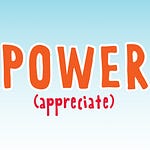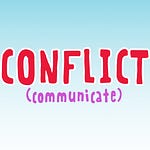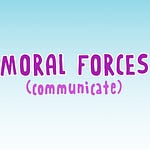Abbie: Hello and welcome to the CosmoParenting Podcast brought to you by the CMM Institute for Personal and Social Evolution. In this space, we invite you to see yourself as someone who is curious about and actively participating in creating your own meaning around parenting.
This is our ‘Validate’ episode, where in the second episode of each month we hear a parenting story, with the hope that sharing the first hand experiences of others who are parenting can make you feel seen and validated in your own experiences. Let’s begin.
*music*
Abbie: Today, I am joined by Dr. Barbara McKay. She is a mother of two grown children and a grandmother to five young grandchildren. Hi, Barbara. Thank you so much for being with me today.
Barbara: Hi, it's really good to be here.
Abbie: I am happy you are here as well to be our first parent for this ‘Validate’ episode. Thanks for being a part of this. And as we continue to think about stories as our first theme, Barbara, can you share a story about stories with us?
Barbara: Well, first of all, I love that you're using the word stories because, as a parent and a professional, I often think about the way that our lives are a series of interconnected stories. And all of us recall stories that we have been told or remember stories that we've been part of. And we recount them and we tell them to other people.
And I was just thinking about my own childhood. And there's a photograph and a story that has traveled with me all my life. And it started off as a little photograph of a two or three year old girl; and I'm dressed in a sundress, I have a bucket and spade, I'm clearly on some kind of mission to get somewhere. And the story that was attached to it that I couldn't have known at that age was, “I'll do it herself,” which was a phrase that I frequently used about anything to do with activity or anything. And that story of independence kind of emerged at that age. And it's traveled into my life and into my parenting. And so one of the things I started to realize is that the story that someone else gave me or attributed to me has found its way into my identity story. And so I started to incorporate that into the way that I think about my parenting and think about myself.
There's an example- I'd like to share this with you- it's about my son. My son is now in his 40s, and this is when he was a teen. I was standing at the front of our house one day, and he walked towards me. And the first thing that I noticed was this- what I considered to be the most appalling haircut. It was a haircut like Keith from Prodigy, which if you haven't seen, it's like got three points. It's a very odd haircut. And I looked at him and he walked towards me, big smile on his face, and I remember saying, “my head's full of words, but I can't get any of them into a sentence.” And he just kind of said, “oh, I thought you'd like it.” And then I remember saying, “which bit of you thought I might like that? “
And then he went into the house and I was stood feeling very perplexed about what I should do next. And when I thought about that story and wondered how come I said what I said, one of the things that occurred to me was that if I had commented on my perception that he'd had this terrible haircut, that might have really affected the way that he and I were relating together. And because I managed to put a tiny bit of space between some of my thinking and some of my speech or some of the things that I was saying, it just gave me enough time to decide what was most important. And what was most important was thinking about how do I preserve my relationship with my son?
And then when I thought about it since, it's interesting, that story of independence. I've started to frame that event so differently. I was thinking, what if I'd seen that haircut and thought, gosh, he's making his own decisions. What if I thought of it as an indication of growing confidence and independence in becoming a young man? What if I thought of all of those things and was able to bring those into my thinking and my speech? And that would foster the kind of relationship that I have always wanted and continue to have with my son. But resisting the temptation to comment on the haircut was quite something that I had to work at.
So that's a kind of interesting idea about how do you avoid talking about the thing that's in front of you and try to think, what does it mean? For my son, it probably meant an ability to take a risk, knowing that I would support him and I would not stop loving him and being affectionate towards him, even if I didn't like the risk that he took.
And I see my son using humor with his three boys. He has three little boys and the middle one that's two, his favorite phrase is “do it myself.” So it's just fascinating the way that these patterns cross generations.
Abbie: What I love about the distinction in what you thought versus what you said is that you didn't lie. You didn't say, “oh, I love it!” But you also didn't say this judgmental phrase, which is what that story would have been that you were telling to your son that I'm judging you.
But you still found a way to say something that was still true to your experience while being thoughtful about the story you were telling. I want to know a little more- if you can share- about how it felt in the moment to make that decision and how you came to make that choice that you did.
Barbara: Yes, and it's so interesting you ask that question because this is a story that I remember so very clearly. So it was a kind of an important moment where I think I was making a specific parental choice.
I think I'd also learned that criticising either of my children didn't really foster the kind of relationship I wanted with them. And it didn't generally change behavior. It just creates an atmosphere of fear. So what I wanted to try to do was to think about what was the meaning of this event and the story in our lives. And what it sort of led me to think is that there are many, many ways of thinking about the same thing.
And if you introduce time and generational ideas as well, you know, my son was walking around thinking he had the best haircut on the planet, and, of course, for him and his friends that would have been true. For myself, maybe you know, his dad, and maybe some of our older relatives, they were completely confused about why on earth he would have done this to himself? So, I think there's another parental learning point for me here is that we can't use our older generational ideas to understand the changing contexts that our children are living in and trying to navigate. And so I think on reflection that's something else that has come out of that episode for me. I have to think what was the world like for him as a teenager? How can I enter his world and better understand that rather than impose my world that might be generationally different?
Abbie: Yes. Like we said in the first week, there's many, many stories and they can coexist even if they feel contradictory. And so it can be true at the same time, for you, that it was a horrible haircut, and true for him that it was the best haircut because those are just the stories you were both telling.
Barbara: It is. And I think one thread that pulls the stories together is my son and I have always had a relationship that is founded on humor. And I think we can tolerate a lot of different perspectives because the foundation of our relationship is about humor.
Abbie: Barbara, thank you so much for sharing your story. And what I think is really valuable for other parents to hear is a kind of reminder to be mindful of what is the story you're telling, not only the story you're telling about your child, the story you're telling to your child, and the story you're telling about yourself as a parent and to yourself as a parent and as a person.
I thank you again for sharing your story and to everyone listening, thank you for joining us, too. Don't forget to check out www.cosmoactivities.com for our other resources in this series, and be sure to comment on this podcast episode on the CosmoParenting Substack. We are so grateful to be on this journey with you. And we will see you next week to explore some parenting best practices.
*music*












Share this post